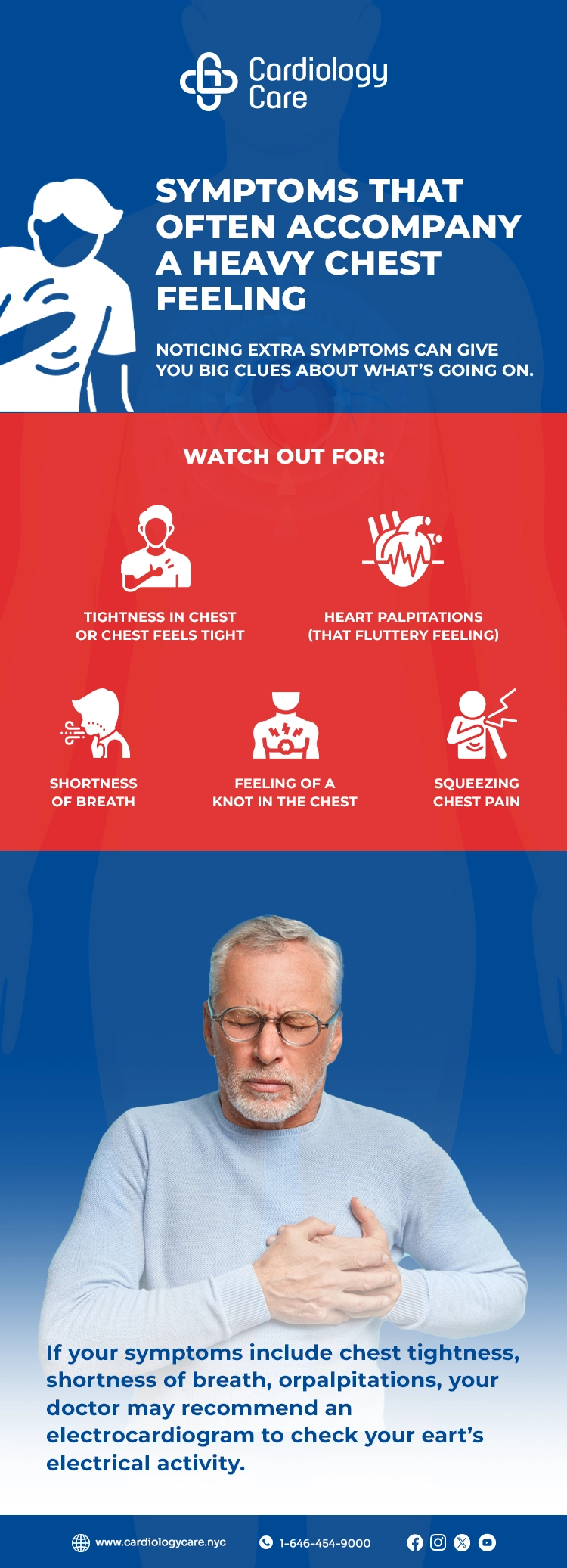Ever feel like there’s a weight sitting on your chest? Whether it’s pressure, tightness, or a heavy sensation, these feelings can be alarming and honestly, for good reason.
While chest heaviness isn’t always a sign of a heart problem, it’s crucial to understand the potential causes. Sometimes it’s just stress or a muscle strain; other times, it could be your body’s way of flashing a warning light.
Table of contents
Why Does My Chest Feel Heavy? Common Causes Explained
If you’re wondering, “Why does my chest feels heavy?” or “What causes chest tightness?”—you’re definitely not alone. Let’s break down the most common culprits:
1. Anxiety and Stress
One of the leading non-cardiac causes of chest tightness is anxiety. Stress can trick your body into thinking it’s under threat, triggering muscle tension, shallow breathing, and that unmistakable feeling of pressure in the chest.
2. Muscle Strain
Have you been lifting heavy things lately? Or maybe you crushed a new workout? Muscle strain, especially in the chest wall, can mimic the feeling of heart-related chest pressure without involving your heart at all.
3. Acid Reflux or GERD
If you’ve ever felt a burning sensation alongside chest heaviness, acid reflux could be the cause. Gastroesophageal reflux disease (GERD) often presents as pressure in the chest without classic heartburn.
4. Respiratory Infections
Bronchitis, pneumonia, and even severe colds can cause tightness in the chest. Infections inflame your airways, making breathing harder and leading to that “heavy” feeling.
5. Cardiac Issues
And yes, angina or a heart attack can cause chest heaviness. Cardiac causes are serious and should be ruled out first when chest symptoms arise.
Important Note:
Never assume it’s “just anxiety” until a doctor has evaluated you. At Cardiology Care NYC, we specialize in distinguishing between heart-related and non-cardiac chest symptoms, offering peace of mind and expert care.
Symptoms That Often Accompany a Heavy Chest Feeling
Noticing extra symptoms can give you big clues about what’s going on. Watch out for:
- Tightness in chest or chest feels tight
- Shortness of breath
- Heart palpitations (that fluttery feeling)
- Feeling of a knot in the chest
- Squeezing chest pain
If your symptoms include chest tightness, shortness of breath, or palpitations, your doctor may recommend an electrocardiogram to check your heart’s electrical activity.
How Anxiety Causes Chest Tightness?
Stress and anxiety don’t just mess with your mind, they impact your physical health too. Here’s how they can cause constant chest tightness anxiety symptoms:
- Rapid heartbeat
- Shallow breathing (you might feel like you can’t get a deep breath)
- Muscle tension around the chest
It can feel eerily similar to heart problems, which is why it’s crucial to get checked out first. Sometimes, stress testing is needed to assess how your heart functions under exertion, especially if your chest heaviness worsens during physical activity.
How to Relieve Chest Tightness?
Wondering “How do you relieve chest tightness from stress or anxiety?” Here are some proven strategies:
- Deep breathing exercises: slow, diaphragmatic breaths calm your nervous system.
- Mindfulness meditation: helps center your mind and reduce body tension.
- Progressive muscle relaxation: systematically tensing and relaxing muscle groups.
- Light physical activity: like walking, helps release pent-up stress.
- Stay hydrated and avoid stimulants like caffeine that can worsen symptoms.
Always see a doctor first if you’re unsure whether your chest symptoms are due to anxiety or something more serious.
When Chest Pressure Needs Urgent Medical Attention
Chest pressure without pain can still be serious. Call 911 or seek immediate care if you experience:
- Chest tightness with shortness of breath, jaw pain, left arm pain, or nausea.
- Persistent chest discomfort that won’t go away.
- New chest symptoms in anyone over 40 or with risk factors like diabetes, hypertension, or family history of heart disease.
A cardiology consultation can help evaluate your heart health and rule out conditions like angina or heart attack. An echocardiogram further checks for structural issues such as heart failure or valve disease. At Cardiology Care NYC, our team offers comprehensive assessments and personalized care to support your heart health.
Conclusion
Chest heaviness or tightness can result from causes like stress, muscle strain, or serious heart disease, so it’s important to listen to your body and seek medical evaluation. For persistent or unexplained symptoms, your cardiologist may recommend Holter monitoring to track your heart’s rhythms over 24 hours. Don’t ignore chest symptoms—early action with expert care from Cardiology Care NYC can make all the difference for your health and peace of mind.
Frequently Asked Questions
Can dehydration cause chest heaviness?
Yes, dehydration can disrupt electrolytes, leading to muscle tension and a heavy chest sensation.
Does sleeping position affect chest tightness?
Lying flat or on your side can worsen pressure, especially with acid reflux or sleep apnea.
Can weather changes trigger chest pressure?
Sudden changes in temperature or air pressure can cause chest discomfort in sensitive individuals.
Can poor posture lead to chest heaviness?
Yes, slouching compresses the chest and lungs, creating a tight or heavy feeling.
Can you have chest heaviness without pain?
Silent ischemia or pulmonary hypertension can cause chest pressure without noticeable pain.
Disclaimer
This blog is for informational & educational purposes only and does not intend to substitute any professional medical advice or consultation. For any health-related concerns, please consult with your physician, or call 911.

